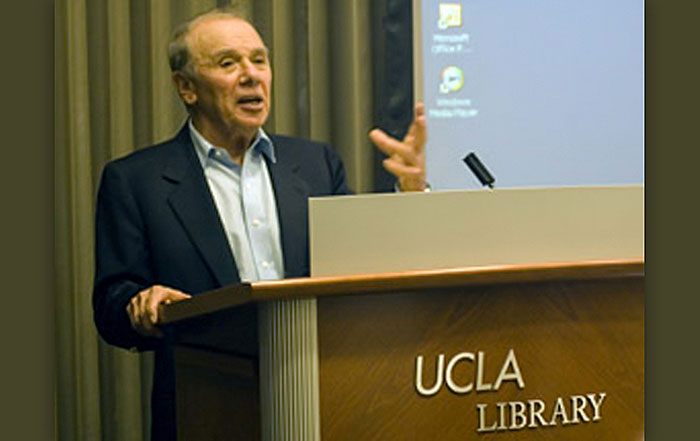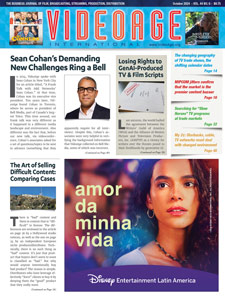When Joseph “Joe” Wallach was working at Brazil’s Globo TV in the 1960s, he had a reputation for being unstoppable. Even now, before speaking to VideoAge at the “mature” age of 97, he took a 1,000-kilometer road trip to Utah in the middle of a pandemic, driving with another couple from his Beverly Hills, California home. Although he was quick to point out that his “wife did most of the driving,” it’s clear that nothing can stop Joe, not old age and certainly not a pandemic.
But then he was shaped by a former U.S. media giant, Time-Life, and worked under Globo’s founder, Roberto Pisani Marinho (1904-2003), a legend in Brazil and throughout the international TV industry, who was simply known as Dr. Roberto.
That kind of legacy prepared him, in 1987, to help co-found Telemundo, one of the two major Spanish-language TV networks in the U.S. In 1991, he co-created GloboSat, a satellite broadcasting service based in Rio de Janeiro.
Throughout his life very few things stopped Joe, whether he was in his native U.S., Brazil, or Italy. In addition to endurance, perseverance and fiscal discipline, Wallach was known for being stingy, “but only when we were strapped for money at Globo,” he pointed out. The story, as related by José Roberto Filippelli, who for many years successfully sold Globo’s telenovelas internationally, was that Wallach’s division heads would first negotiate prices for programming and/or services, then, when the agreements would reach his desk, the cost would be cut drastically. “Wallach is credited with reassessing Globo’s finances. He was a good money manager,” added Filippelli.
“Joe and I have about a 55-year friendship,” recalled former president of Warner Bros. TV Distribution, Michael J. Solomon, who now serves as CEO of Solomon International Enterprises. “I remember when, as the head of Latin America for MCA in 1970, I offered Joe a great package of features for Globo TV. He asked for a day to study the package and the license fees I was asking. We met in his office (in Rio) and started arguing about the fee. It got so heated that after 30 minutes of not convincing him, I took the offer from his desk and tore it up in front of him and walked out. The next day he asked me to come back and we made the deal. From that time on, we became good friends — and still are,” concluded Solomon, who’s also Wallach’s neighbor in Beverly Hills.
According to Filippelli, who’s now writing an autobiography about his experiences with Globo from 1977 until his departure in 1999, the deal that Wallach initially offered him to license Globo’s telenovelas internationally included a low salary and high sale commissions. However, when Filippelli started to sell Globo’s programs well, the Marinhos renegotiated his contract with a higher base salary and lower commissions.
Filippelli declined giving a sales figure, but Wallach mentioned that, when he left Globo in 1980, international content sales were down to about U.S.$1 million ($3.5million in 2020 dollars).
Over the phone, Wallach explained to VideoAge that, before joining the then three-year-old Time-Life (T-L) group in 1963, he was in the manufacturing business in Pennsylvania. Before that, he’d completed his post-graduate studies in Business at Boston University. His under-graduate studies were conducted at The City College in his native New York. Earlier, he’d served as a First Lieutenant in the U.S. Army Infantry during World War II in Europe.
Wallach managed KOGO, a TV outlet in San Diego, California, for T-L. It was part of its group of five local TV stations, which were all sold in 1972.
T-L was also a financial backer for commercial TV broadcasting in South America. With a joint venture between U.S. TV network CBS and Argentina’s TV pioneer Goar Mestre, T-L backed Proartel (now Artear) in Buenos Aires, while in Venezuela, the company invested in Proventel (now state-owned TV network VTV), and in Peru, Panamericana Television. In Brazil, the firm backed Globo TV (Rede Globo in Portuguese).
Wallach arrived in Brazil in July 1965 as a T-L executive tasked with checking in on the company’s investment in Rede Globo, a television network that had begun broadcasting in Rio de Janeiro three months earlier. The network had been founded by Roberto Marihno in 1963 (although its TV license was granted in 1957). Earlier, Dr. Roberto had taken over his father Irineu’s newspaper, O Globo, which was founded in 1925, after his death that same year.
Recalled Wallach: “The network had 700 employees, counting 70 in the orchestra, and Brazil had just three million television sets. It was airing live programs — popular variety-show segments featured dancing girls and pie-eating contests — and U.S. shows like the Beverly Hillbillies.”
Then disaster struck. “On a Sunday night in 1969 in Rio,” recalled Wallach, “Dr. Roberto called me to say that their TV station in Sao Paulo was burned by revolutionaries together with two other TV stations. Fortunately, they did not get Globo’s transmitting tower, and we were insured. At that time Sao Paolo was Globo’s main production center.
We did not know what to do; there wasn’t yet a network system. We did not have a microwave system for interconnections. The networking was done through videotapes. I suggested moving everything to Rio and Dr. Roberto supported my decision.”
He continued: “After the fire, Time Life called me back to New York. They complained that in four years they invested $5 million ($41 million in 2020 money) into the venture and were upset that the investment did not produce any revenues. Globo didn’t have money, but in 1969 Dr. Roberto was able to buy out their stake for $3.850 million in four payments, the last one by 1972. It was awkward for me since I was the Time-Life man but I chose to work for Marinho.”
When Wallach left T-L to officially join Marinho in 1969 his title was executive supervisor (superintendente) in charge of Administration for the Globo TV network. He shared his duties with Walter Clark Bueno (1936-1997), who was also head of Programming because the law prevented Wallach (who wasn’t yet a Brazilian citizen) from assuming managerial positions. In addition, they each received a $1 million a year salary ($4.5 million in 2020 money), which then represented the highest salary in the TV broadcasting sector worldwide.
In 1977, Clark Bueno was fired because of his heavy drinking and his duties (and salary) was taken over by Jose Bonifacio de Oliveira Sobrinho (aka, Boni).
Meanwhile, in 1970, Wallach was granted Brazilian citizenship, and became fluent in Portuguese, a language he had learned six months after arriving in Rio. He spoke it with a “gringo accent,” though, noted Filippelli. (In order to become a naturalized Brazilian he had to renounce his U.S. citizenship, which was later reacquired.)
In the beginning he communicated with Dr. Roberto in “broken French” since Marinho did not speak English, but babbled in French. Wallach also managed to learn Spanish, which helped him later on for Telemundo.
Wallach and Marinho led Globo TV during Brazil’s tumultuous years under a military dictatorship (1964 to 1985). Wallach remembered years of crackdowns, when Globo TV had to have scripts approved by officials, and censors were literally in the news department.
The dictatorship, however, also provided a basis for Globo to grow. From the mid-60s to the 70s, the military government saw television as a way to solidify a national identity. It subsidized the purchase of television sets and pushed microwave and satellite systems, increasing the market that Globo TV could reach.
At the same time, suspicion about Globo TV’s U.S. connections was widespread. A month after he arrived in Brazil, Wallach recalled, he was summoned before a congressional panel investigating foreign interventions. He was questioned for five hours about everything from Time-Life’s involvement with Globo to his feelings about the Vietnam War.
Nonetheless, the U.S. involvement in the company did give Globo a corporate infrastructure that allowed the network to grow. Wallach imposed a tight budget and was instrumental in ridding the network of corruption.
“Globo’s founding president was a courageous man,” Wallach recalled, “He was constantly debating with the military,” which often threatened to take over Globo TV.
In addition, Globo TV’s novelas were not just ubiquitous in Brazil, but thanks to Filippelli, were sold to over 100 countries around the world, from East Timor to Angola to the U.S.
Thereza Quintella, Consul General of Brazil in Los Angeles in 2005, recalled a story from Portugal, where the parliament session was interrupted so that legislators could watch the final episode of Gabriela, a 1970s Globo TV novela starring Sônia Braga. “This is the woman who stopped Parliament,” she said.
In 1985, five years after leaving Globo, with Reliance Capital Group’s executives Saul Steinberg and Henry Silverman as partners, Wallach acquired KVEA (formerly KMTW, and KBSC), a Spanish-language TV station in Los Angeles for which he became its general manager.
The following year, Reliance acquired John Blair & Co., which in Puerto Rico owned WKAQ-TV. Reliance also purchased New Jersey’s WNJU-TV in 1986. Two years earlier, Jerry Perenchio and Norman Lear, who had acquired WNJU in 1979, joined KSTS in San Jose, California, in forming NetSpan, the second Spanish-language television network (behind the older Univision). Under Reliance, Wallach’s KVEA and Blair’s WKAQ became NetSpan affiliates.
In Puerto Rico, WKAQ was known as Telemundo, so in 1987 after Reliance went public, with Wallach’s advice the group decided to rebrand NetSpan as Telemundo (now part of NBCUniversal), but did not include WKAQ as an affiliate. Ironically, “Telemundo” was also the brand name of Cuba’s CMBA-TV, established in 1953 and later affiliated with the CBS TV network.
Wallach managed his Telemundo affiliate station until his departure in March 1987 over a dispute over Reliance’s heavy debt caused by various TV stations acquisitions. Wallace was not in favor of the acquisitions, pushing instead to make KVEA a Spanish-language superstation.
In the 1980s, Wallach got involved in another political and financial intrigue, this time in Italy. After leaving Telemundo in 1987, Wallach became a consultant for Italian network Tele Monte Carlo (TMC), which was owned by Globo TV. TMC (now La 7) was a small television channel broadcasting to Italy from Monaco that was allowed to broadcast live due to a loophole in the 1974 Italian law stating that foreign television stations were allowed to broadcast into Italy through an Italian company that retransmitted the signal into Italian territory. That Italian company, a subsidiary of TMC, was TV International (TVI).
For that venture, Wallach traveled extensively to Italy from 1987 to 1990. In July 1985, Rede Globo took control of TMC-TVI (by investing U.S.$2.5 million and assuming TMC’s $5 million debt). According to Wallach, Dr. Roberto had the opportunity to invest in Telemundo in the U.S., but he rejected the idea.
Earlier, in 1982, RAI, the Italian state broadcaster, headed by representatives of the Christian Democracy party (DC), had feared Silvio Berluscon’s Fininvest would purchase TMC, and so it acquired 10 percent of TMC and provided it with four hours of daily programs. In exchange, RAI got the right to veto the selling of the station to future buyers, but approved the sale to Globo.
From splicing together past reports in VideoAge, it is clear that Italian politicians played Marinho as soon as they realized his interest in entering the Italian TV market.
The interest was fueled by large sales of Globo’s programs to private Italian TV stations and the fact the Dr. Roberto’s oldest son, Roberto Irineu, wanted to move to Italy (he spoke perfect Italian). Filippelli recalled that he’d moved to Italy when he started selling Globo’s content in 1977 in a small townhouse in Rome. Two years later the operations moved to a “splendid rented palace,” which was also occupied by TMC.
In 1985 Globos’s sales moved to London, but Irineu continued to live in the same apartment he had rented in Rome’s historical center. In 1994, Dr. Roberto explained to the daily Corriere della Sera the Marinhos’ familial ties to Italy. Marinho’s mother was born in Salerno and immigrated to Brazil at an early age.
Globo’s arrival in Italy was welcomed by center and center-left political forces as an alternative to Berlusconi’s growing influence in both the national TV market and in politics. But, while the military dictatorship in Brazil was just one entity that needed to be dealt with, the Italian political scene was more complex, with three major parties, many splintered factions, and different media agendas. The DC and Communist party representatives emphasized their shared Latin roots and Globo’s value as an alternative to U.S. domination, while the Socialist party supported Berlusconi.
Later on Dr. Roberto complained about the strong influence exerted by Italian politics on private media, blaming the intrusion for the failure of the TMC project.
Starting in 1987 (and lasting until his final exit from Italian television in 1994 due to heavy losses), Marinho negotiated several partnership agreements with Italian economic heavyweights, especially with those operating in the Brazilian market, but to no avail.
In 1990, after almost two years of searching for a partner/buyer, and following several ill-fated transactions, Globo finally sold 40 percent of its TMC stock to the Italian Ferruzzi Group, which was expanding into the Brazilian market. In 1993, Globo sold another 20 percent of its remaining stock to Ferruzzi and lingered as a minority partner until its final exit in 1994. In June 1993, a few months after acquiring 60 percent of TMC, the Ferruzzi Group went bankrupt, and its CEO, Raul Gardini, committed suicide after his involvement in a political scandal involving kick-backs to politicians became known.
In 1994, TMC was sold to producer Vittorio Cecchi Gori, who five years later sold it to Telecom Italia, which, in 2001 changed its name to La 7. In 2013, La 7 was acquired by Urbano Cairo, a former assistant to Berlusconi.
Meanwhile, in 1991 Wallach returned to Brazil and, with Dr. Roberto and Boni, jointly founded GloboSat (now Canais Globo), a satellite broadcasting service based in Rio de Janeiro. As president of GloboSat Wallach launched and operated the first pay-television, four-channel DBS broadcast system covering Brazil. He ran GloboSat until 1993, when he went back to Los Angeles to handle small ventures. He finally retired in 1995.
Wallach is the author of the autobiographical book, My Chapter in Globo TV (Meu Capítulo na TV Globo), a Portuguese-language book published by Top Books, Rio de Janeiro, in 2011.
He still continues to travel to Brazil today. He last visited the country in November 2019 as a guest of the 73-years old Roberto Irineu, who, Wallach reported, recently underwent a successful liver transplant.
(By Dom Serafini)
Audio Version (a DV Works service)













Leave A Comment